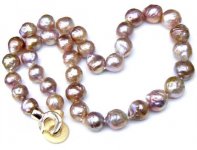Wow this is a great thread. ...however it starts out with ***several falsities!****
Japan Kasumi pearls are NOT nucleated with Akoya pearls. They are nucleated with shell nuclei! Referring to them being "plated beads from Japan" is simply an uneducated statement.
The skill of these Japanese farmers is the ONLY reason that similar looking pearls are now available from Chinese fresh water pearl farms at all!
In my experience people buy Japan Kasumi pearls because they enjoy having all varieties of pearls in their collection and they realize the provenance of Japan Kasumi pearls to be quite unique and valuable.
Citing the difference in cost as being a "nominal" cost of labor is an unfortunate perspective with obvious holes in it.
There are currently 3 farmers producing pearls at Lake Kasumi ga Ura Japan.. That's 3.. Only 3!
There's at very least 3,000 people employed to produce the Chinese fresh water pearls which look similar.
For a very long time Japan Kasumi was the only fresh water pearl you could buy with such size and color.
Thankfully for the consumer market now you can buy them for a fraction of the cost from Chinese waters. We have sold Japan Kasumi pearls for nearly 20 years and will continue to do so as long as they are being produced. We also sell all varieties of Chinese fresh water pearls. We believe that there are pearls for everyone and now they are much easier to afford for most people.
Generally we only sell baroque pearls from Lake Kasumi ga Ura JAPAN.. so those are most of the photos that you will see on line. I have seen, and sold round and highly lustrous Japan Kasumi pearls and although the sizes coming out of China today are not paralleled from the Japanese waters, the quality is. This is also a very hard thing to compare given the overwhelming QUANTITY difference.
I am constantly dismayed that the Chinese fresh water pearls are being referred to as "Kasumi" pearls, but this is not a battle I can win .. and although I don't much care for the term "Edison" pearl, at least it is not confusing people as to the origin of their pearls. So as a general rule, if you see Kasumi pearls being advertised, do some research before you assume they are from Japan.
Amanda:
I do not hope that these Japanese farmers lower their prices, I hope that they continue to grow beautiful pearls against all odds..
I hope that buyers educate themselves and rejoice at all of their current options. Farmers like those at Japan Kasumi are the heart and soul of the pearl market today and without them, there would be no Edison pearls... and nothing to call "neon green"

...
Thank you Wendy, Karin, and Pattye


